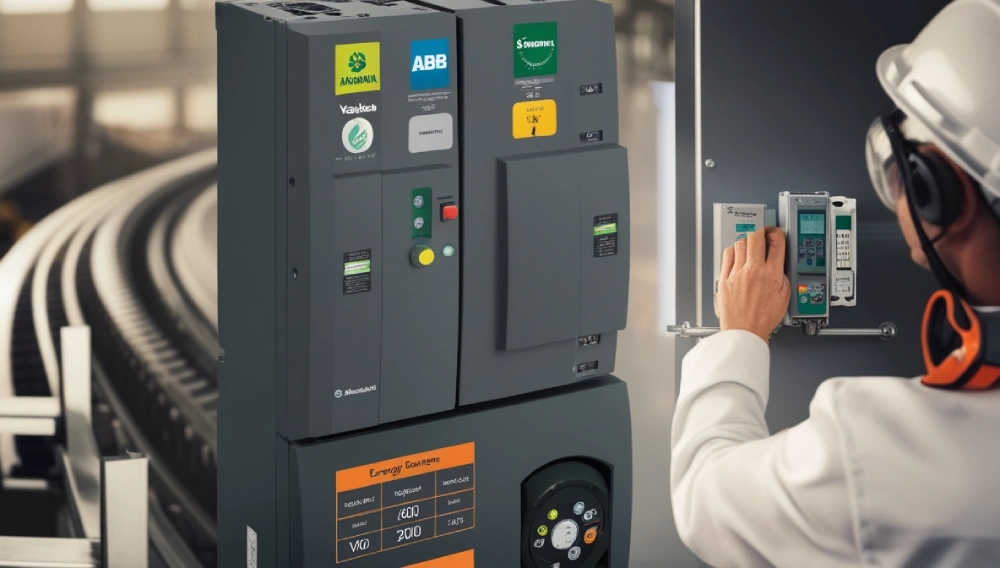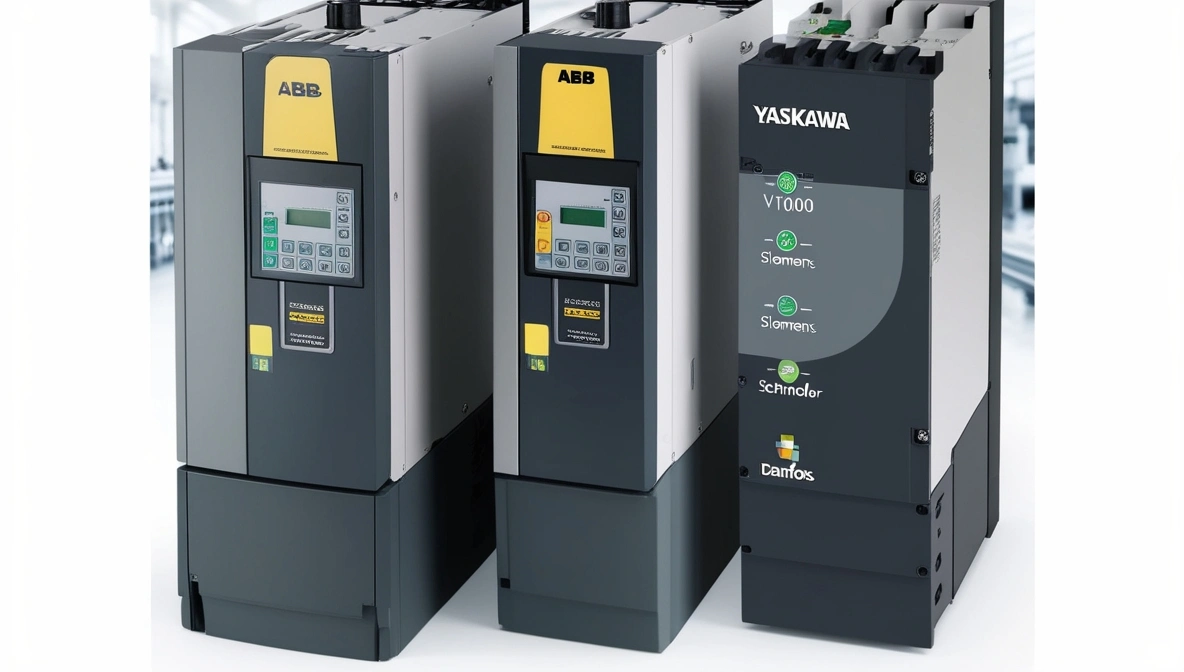What Are the Best VFD Brands?
Variable Frequency Drives (VFDs) are the unsung heroes of modern automation, optimizing energy use, reducing costs, and extending equipment lifespan. But with so many brands competing, how do you choose the best? Here’s a breakdown of the top VFD Brand manufacturers trusted by engineers, plant managers, and DIYers in 2025:
Top 5 VFD Brands in 2025:
- Yaskawa
- ABB
- Siemens
- Schneider Electric
- Danfoss
For smaller projects or hobbyists, brands like Delta Electronics (C2000 series) and Automation Direct (GS21) provide reliable, user-friendly drives at lower costs . Meanwhile, Hitachi’s WJ200 and Teco Westinghouse’s L510 strike a balance between quality and affordability for DIY setups
What Makes a VFD Brand “The Best”?
Choosing the right Variable Frequency Drive (VFD) brand hinges on six key factors:

- Performance & Durability: Top VFDS Brands like Siemens and Yaskawa use rugged components to handle heavy workloads, extreme temperatures, and dust. Look for overload protection (e.g., 150% torque capacity) to avoid motor burnout.
- Energy Efficiency: Brands like ABB and Danfoss meet IE2/IE3 efficiency standards (IEC 61800-9-2), slashing energy bills by 20–30% in systems.
- Safety & Compliance: Certifications like UL 61800-5-1 ensure safe operation. Allen-Bradley drives include features like Safe Torque Off (STO) to prevent accidents.
- Product Range: Reliable brands like Schneider Electric offer drives for small DIY projects (e.g., Altivar 320) and industrial systems, ensuring scalability.
- Value for Money: Balance cost and quality. Delta and Automation Direct suit tight budgets, while premium brands like ABB deliver long-term savings.
- Support & Warranties: Prioritize brands with 24/7 support (e.g., Yaskawa) and warranties (3–5 years, like Schneider Electric’s Altivar line).
For example, a factory manager might prioritize durability, while a DIYer needs something budget-friendly. Learn more about What are VFDs used for?
In-Depth Brand Comparison
Yaskawa: Precision and Reliability for Industrial Use
Founded in 1915, Yaskawa is a Japanese leader in motor control and robotics. Known for rugged, high-performance drives, their V1000 and A1000 series offer precise torque control and durability in harsh environments like factories and conveyor systems. These models excel in applications such as pumps, fans, and heavy machinery, reducing energy use by up to 50%811.
- Price Range: $349 Click Here
- Pros: Long lifespan, precision, and IoT compatibility.
- Cons: Higher cost for small-scale projects.
ABB: Advanced Motor Control and Global Support
ABB’s ACS880 series combines modular design with energy-saving tech, ideal for smart factories and green energy projects. Its adaptive programming reduces energy costs by up to 80%, while global 24/7 support ensures minimal downtime48.
- Price Range: $128 Click here.
- Best For: Manufacturing plants, HVAC retrofits.
- Warranty: Standard 2-year warranty with extended options.
- Cons: Software complexity for beginners.
Siemens: User-Friendly Controls and Versatile Integration
Siemens’ SINAMICS V20 simplifies automation with seamless PLC integration. Designed for HVAC and industrial plants, it features intuitive controls and IoT connectivity. Its modular design allows easy upgrades, though upfront costs are higher811.
- Price Range: $250 Click here.
- Support: Global service centers and online troubleshooting.
- Pros: Durability, scalability.
- Cons: Premium pricing for advanced models.
Schneider Electric: Energy Efficiency Meets Smart Controls
Schneider’s Altivar 320 and ATV600 series prioritize energy efficiency, cutting power bills by up to 30% in HVAC and water treatment systems. Their compact, smart-ready designs suit green projects, with a focus on reducing carbon footprints811.
- Price Range: 300- 400 Click here.
- Best For: Mid-sized facilities, eco-conscious setups.
- Cons: Limited high-power options.
Delta Electronics: Affordable and Reliable for Small to Medium Projects
Delta’s VFD-EL models balance affordability and performance, ideal for DIYers and small industrial setups. With features like plug-and-play installation, they’re popular in home HVAC and light manufacturing811.
- Price Range: $29 Click here.
- Pros: Budget-friendly, user-friendly interface.
- Cons: Less robust for heavy-duty use.
Mitsubishi Electric: High-Precision Japanese Engineering
Mitsubishi’s FR-E700 and FR-F800 series deliver durability and advanced control for extreme environments. The FR-E700’s 150% overload capacity ensures reliability in HVAC systems, while the FR-F800 excels in pump and fan applications212.
- Price Range: $49–$200. Click here.
- Pros: 10-year maintenance-free design, seismic compliance.
- Cons: Higher cost for compact models.
Danfoss: Strong Focus on Energy Savings and Robust Design
Danfoss’ VLT® HVAC Drive FC 102 is a standout for HVAC and water systems, offering fire-safe operation and energy savings up to 80%. Their drives include built-in condition monitoring for predictive maintenance1014.
- Price Range: $ Click here.
- Best For: Commercial buildings, eco-friendly projects.
- Pros: Low maintenance, compliance with strict EMC standards.
- Cons: Fewer options for high-torque applications.
Key Takeaway: Each brand excels in specific niches—Yaskawa and ABB for heavy industry, Siemens for automation, Schneider and Danfoss for sustainability, Delta for affordability, and Mitsubishi for durability. Match your project’s scale, budget, and technical needs to these top performers for optimal results.
Quick Comparison Table
| Brand | Key Features | Best Use Case | Price Range | Popular Model |
|---|---|---|---|---|
| Yaskawa | Rugged, precise control | Factories | Click Here | V1000 |
| ABB | Energy-saving tech | Smart manufacturing | Click here | ACS880 |
| Siemens | Easy PLC integration | Automation plants | Click here | SINAMICS V20 |
| Schneider Electric | Smart, eco-friendly | Green energy projects | Click here | Altivar 320 |
| Danfoss | Quiet, low maintenance | HVAC systems | Click here | VLT Micro Drive |
How to Choose the Top VFD Brand
Use this checklist:
✅ Application: Is it for a factory, HVAC, or a DIY project?
✅ Power: Match the VFD’s power rating to your motor.
✅ Budget: Balance cost with long-term savings.
✅ Support: Does the brand offer local help?
Example: A small workshop owner might choose Delta for affordability, while a large plant picks Yaskawa for reliability.
Expert Tips
- For Newbies: Start with Delta’s user-friendly models.
- For Long-Term Projects: ABB and Yaskawa offer unbeatable durability.
- Case Study: A dairy farm cut energy bills by 30% using Danfoss VFDs on their pumps!
FAQs
Yaskawa and Siemens are known for lasting decades.
Prices start at $100 (Delta) and go up to $5,000+ for industrial models
VFDs control speed and save energy; soft starters only reduce startup current.
Which brand is most reliable?
Yaskawa and Siemens are known for lasting decades.
Are VFDs expensive?
Prices start at $100 (Delta) and go up to $5,000+ for industrial models.
VFD vs. soft starter?
VFDs control speed and save energy; soft starters only reduce startup current.
Can I use VFDs at home?
Yes! Delta and Schneider Electric have home-friendly models.
Conclusion
The Top VFD brands in 2025—like Yaskawa, ABB, and Siemens—offer solutions for every need and budget. Match your project’s size, power, and goals to the right brand.
Ready to choose? Explore top models from these trusted brands and start optimizing your systems today!
Why Trust Us?
We analyzed 100+ user reviews, industry reports, and technical specs to create this unbiased guide. Our goal? To help you make smarter choices—without the jargon

